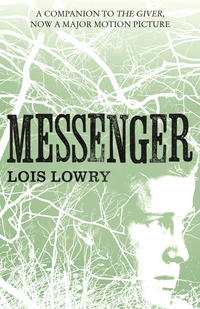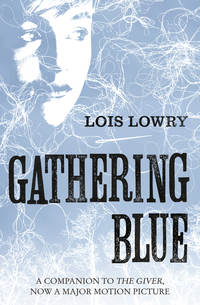
Полная версия
Son
“He hardly sleeps. Classic failure to thrive. So they’ve decided not to assign him to a family at the Ceremony. We’re going to keep him here another year, give him a chance to mature a bit. Some newchildren do take longer than others. Thirty-six has been very difficult.
“I take him back to my dwelling at night,” he explained. “The night crew here has been complaining about him. He keeps the others awake. So he spends nights with my family.”
He reached for the infant and Claire relinquished him reluctantly. As she passed him from her arms into the man’s, she felt something. She pushed the blanket aside and looked at a metal bracelet encircling one tiny ankle.
“What’s this?”
“Security. It would set off an alarm if he were removed from the building.”
Claire took a quick breath, recalling the thought she had had briefly: I could take him.
“All the newchildren wear them. I’m not sure why. Who would want one?” The man chuckled. “I’ll take his off when I take him with me at the end of the day.”
The infant slept on, and the man murmured to him quietly. “Good boy,” she could hear him say. “Coming home with me tonight? That’s a good, good boy.”
He turned away, still murmuring, and took the newchild back to his crib. Watching and listening, Claire thought she heard the nurturer whisper a name. But she couldn’t quite make out what it was. Abe? Was that it? It sounded, she thought, like Abe.

CLAIRE DIDN’T ATTEND the Ceremony. Almost everyone in the community did, every year. But each facility needed to leave someone in charge, and Claire had volunteered to stay at the Hatchery. The Birthmothers, the Vessels, were exempt, and so Claire had not attended the two previous years either; and now she found that she didn’t have much interest in the two-day event anymore.
The Naming and Placement of Newchildren was always first on the program, so that the infants could be taken away and cared for during the remaining hours, and wouldn’t be disruptive. Claire would have wanted desperately to attend the Ceremony if her own child, Abe (she was trying to think of him now by the name she had overheard) were to be given to a parental pair. But it would be another year for him, and she had little interest in watching the placements of the others.
Neither did she care much about the Matching of Spouses. Like Claire, most people found the Matching boring—important, of course, but with few surprises. When an adult member of the community applied for a spouse, the committee pondered for months, sometimes even years, making the selection, matching the characteristics—energy level, intelligence, industriousness, other traits—that would make two people compatible. The spouse pairs were announced each year at the Ceremony and shared a dwelling after that. Their pairing was watched and monitored for three years, after which they could apply for a child, if they wished. The Assignment of the Newchild, when they received one, was actually more exciting than the Matching.
Thinking about it as she wandered the halls of the empty lab, so quiet and unoccupied today, Claire found herself wondering, suddenly, if she would be able to apply for a spouse. As Birthmother, she had not been eligible. But now? Rolf, her coworker, had put in an application and was waiting. And so had Dimitri, she’d heard. Could she? She wasn’t old enough yet. But when she was? She didn’t know. The regulations for ordinary citizens were so clear, so well known, so carefully followed. But Claire’s situation was unusual. And she had been given very little information when she was dismissed and transferred to the Hatchery. It was as if they had lost interest in her. They. She wasn’t even sure who they were. The Elders. The committees. The voices that made announcements over the speakers, like the message this morning: PLEASE GATHER AT THE AUDITORIUM FOR THE OPENING OF THE CEREMONY.
She glanced at the time. It was late morning now. The spouses would be paired, the newchildren named and assigned. Soon there would be a lunch break, with tables set up and lunch packets distributed, outside the Auditorium. Then they would reconvene for the beginning of the Advance in Age and the rituals of growing older.
The younger children were presented in groups: all the Sevens, for example, receiving their front-buttoned jackets; the Nines, brought to the stage and given their first bicycles to great applause. Haircuts for all the Tens, with the little girls losing their braids, and then the sweepers coming quickly to the stage to remove the shorn hair. But the Advance in Age Ceremonies usually moved quickly along, to applause—and some laughter as well, because every year someone burst into tears for one reason or another, or felt compelled to show off on the stage and did something foolish.
Claire had participated in those rituals throughout her childhood. She didn’t mind missing them now.
The Ceremony of Twelve, which would begin on the second morning, was always the highlight. Here was when the unexpected could happen, as the children received their Life Assignments. It had always been fun, watching the Assignments given out. Until her own, of course.
Well. It was in the past. But she was happy not to be there today, in the audience, watching as other young girls heard that they too had been found fit only to breed.
It seemed odd, the silence with everyone gone for the day. There was not much, really, for her to do; she was simply required to be there, to be certain nothing went awry. But everything—the temperature in the labs, the humidity, even the lighting—was carefully calibrated and controlled. Claire checked the screen of her computer periodically for incoming Hatchery messages, but nothing was urgent.
She glanced through a window at the supply boat that was moored at the dock. It had arrived at a bad time. With the Ceremony taking place, they would have to wait two days before they could unload. Probably, she realized, they’d be happy to have some time free of work. She wondered what the crew was doing on this unexpected vacation. She had watched them previously, and heard them, lifting and stacking and carrying and directing. Their clothes were different; they didn’t wear the loose-fitting tunic of the community. And they spoke with a slight accent, an inflection that was unfamiliar.
Claire had never been curious about those from Elsewhere. It was part of the contentment she had always known. Here had always been enough.
Now, through the window, she stared at the heavy-laden moored boat and found herself wondering about its crew.

THAT LUNCH WAS pretty awful, wasn’t it?”
Eric entered the lobby of the Hatchery with the others at the end of the day. The group was noisy and laughing, obviously happy to be finished with the hours of ritual, sitting, paying attention, politely applauding.
“It wasn’t so bad,” one of the other workers replied. “Just wasn’t enough of it! I’m still hungry.”
Claire was seated at the receptionist’s desk. “It’s almost time for dinner,” she told them. “How was the Ceremony?”
“Fine,” someone said. “They got all the way through the Elevens, so there’s only the Ceremony of Twelve left for tomorrow morning.”
“Good. It went smoothly, then. No children misbehaved or had a tantrum,” Claire said, laughing.
“Nope. No surprises at all,” Edith told her.
“Except maybe for Dimitri,” Eric announced.
“Dimitri?”
Everyone chuckled. “He thought he’d be assigned a spouse. He was on the edge of his seat. But they didn’t call his name.”
“Oops. That means he has another whole year to wait,” Claire said.
“Or more!” Eric pointed out. “There have been people who waited years for matching.”
“Well, it’s for the best,” Edith commented. “There probably wasn’t a good match for him available this time.”
A young man whose name Claire didn’t know had been listening. “He only applied for a spouse because he wanted a dwelling,” he said. “He’s tired of living in the dorm.” He turned, seeing Dimitri come through the door. “Even though he gets a special suite, for being director. Isn’t that right, Dimitri? You’re sick of the dorm, right?”
Dimitri crushed the program he was carrying into a wadded ball, and tossed it at the young man. “I’m sick of living with you, that’s all!” He grinned, picked up the paper where it had fallen, and tossed it into the trash receptacle.
They hung their jackets on the row of pegs beside the front door. “Everything quiet here, Claire?” someone asked.
She nodded. “A couple of the boatmen came ashore and went for a walk. I saw them strolling along the river path.”
“Those guys are so odd,” Eric commented. “They never talk to anyone.”
“Maybe it’s against their rules,” Claire suggested.
“Could be. Elsewhere probably has completely different rules.”
“Actually, talking to them might be against our rules. Has anyone checked?” Edith asked.
Everyone groaned and most of them glanced at the large monitor on the receptionist’s desk.
It occurred to Claire that she could check on the rules and answer her own question about whether she could apply for a spouse. But did she care, really? Enough to make her way through the lengthy index and perhaps find her answer in a sub-subparagraph or footnote? Probably not, she thought.
The loud rasp of the buzzer summoned them all to the cafeteria for the evening meal. She rose and found her place in the line. From a window in the hallway, she noticed two members of the boat crew lounging on the deck of the vessel. It was heavily loaded with crates of cargo, and the two young men sat side by side, leaning against a sealed container. Each of them held a small cylinder to his mouth, and it appeared that they sucked smoke from it and then blew the smoke into the air. It was an odd custom that she had not seen before, and she wondered what its purpose was. Perhaps it was a medicinal inhaler of some sort.
The line moved forward. Conversations, laughter, and comments interrupted her thoughts. Claire approached the stack of trays, took hers from the top, and saw that Edith and Jeannette had saved a seat for her at their table. She moved ahead, holding her tray out to the serving person behind the counter, and put the boat crew out of her mind.
“What was the Naming of Newchildren like?” she asked them after she had sat down with her tray of food. “Were there any surprising names?”
“Not really,” Jeannette said, “except I was startled to hear that one, a boy, was given the name Paul. That was my father’s name.”
“But they can’t use the same name twice!” Edith said. “There are never two people in the community with the same name!”
“But they do regive names,” Claire pointed out, “after someone is gone.”
“Right. So that means my father is gone. I was surprised to hear it,” Jeannette said.
“When did you see him last?” Claire asked. She could remember her own parents, but it had been several years, and details about them had begun to fade.
Jeannette thought, and shrugged. “Probably five years. He worked in Food Production, and I never go over that way. I see the woman who was my mother now and then, though, because she’s in the landscaping crew. Not very long ago I noticed her trimming the bushes over at the edge of the recreation field. She waved when she saw me.”
“Nice,” Edith said, offhandedly. “You want the rest of that salad? Can I have it?” Jeannette nodded, and Edith reached for the half-empty plate that had been set to the side.
“Paul’s a handsome name,” Claire said, feeling a little sorry for Jeannette, though she didn’t know exactly why. “It’s nice when they reuse a good one. I remember back when I was a Ten, they named a newchild Wilhelmina, and everyone cheered, because everyone had been fond of the previous Wilhelmina before she entered the House of the Old. So when she was gone, it was nice to reuse her name.”
“I remember that. I was there,” Edith said.
“Me too,” Jeannette recalled. “Nobody cheered when they named the new Paul. But I think there was a feeling of satisfaction. People liked my father,” she said. “He was nice. Very quiet. But nice.”
They finished their meal in silence. Then, at the sound of the buzzer, they stacked their plates and began to tidy their table.
* * *
It was dusk. The others were tired after the long day of the Ceremony. Anticipating another day of it tomorrow, they had drifted off to their rooms early, after the evening meal. But Claire found herself restless after the day indoors. She decided to take a walk.
The path along the river was shaded and pleasant at this time of day. Ordinarily she would have encountered others walking, and exchanged greetings. But no one was out and about this evening; it had been a long day for them all. Claire wandered beside the water until she approached the huge bridge. It was forbidden to cross it without special permission, and she had no idea what lay beyond, on the other side. There was nothing visible but trees. It was simply Elsewhere. She had heard people say that occasionally, though rarely, small groups were taken to visit other communities. But perhaps it was just a rumor. Claire herself had never known anyone who had seen Elsewhere.
Standing at the base of the massive concrete supports that formed the foundation for the bridge, Claire measured it with her eyes. The barge that was now moored by the Hatchery must have barely fit beneath.
If she crossed the intersecting road here, she would continue along the river path and pass the large barn that housed official vehicles. Citizens made their way around the community only by bicycle, but large deliveries were transported by trucks, and sometimes maintenance required heavy equipment. It was all stored here. Claire remembered a few years back, when she had been a Ten or a Nine, the boys who were her age-mates had all been fascinated by the vehicle barn. They had, almost all of them, yearned to be assigned a career involving transportation so that they could be trained to drive the equipment.
But it had never interested Claire, and it didn’t this evening. She turned onto the main stretch of road and walked to the northwest, away from the river, with the central plaza spread out on her left. She passed the Auditorium, which stood at the end of the plaza; earlier in the day the community had gathered in throngs on its steps, and they would be there again in the morning. But now, at dusk, the plaza was empty and the large building that dominated its southwest border was quiet and seemed unoccupied.
She realized that she was walking toward the Nurturing Center. She could turn left there and continue on past the Infirmary and the Childcare Center, making a large loop that would take her back to the Hatchery.
“Hi there!”
The man’s voice startled her. The entire community had been so still. But looking up, Claire saw the bicycle stopped at the corner of the plaza. She recognized the nurturer who had been so pleasant to her during her visits. She smiled, waved, and walked toward the corner where he waited, one foot on the ground, balancing his bike.
He put one finger to his lips as she approached. “Shhh.” Then he gestured toward the back of his bicycle, where a carrying basket had been attached. As she came near, she could see that there was a sleeping infant in the basket. “Finally he’s asleep,” the man whispered. “I’m taking him home for the night.”
Claire nodded and smiled down at Newchild Thirty-six.
“Were you at the Ceremony?” the man asked.
She shook her head. “I volunteered to stay at the Hatchery. I’ve been to enough Ceremonies.” She kept her voice lowered, as he had.
The nurturer chuckled softly. “I know the feeling,” he said. “But it was fun for me today. Part of my job is giving the newchildren to their parental units. The new mothers and fathers are always so excited.
“I’m glad we get to nurture this one for another year, though,” he added, reaching to touch the edge of the basket. “He seems pretty special.”
Claire nodded in agreement, not trusting herself to speak.
“Gotta go,” the man said. He placed his right foot on the uptilted pedal of the bike. “Tomorrow’s a big day for my family unit. Our son’s a Twelve this year. Lots of nervousness and apprehension.”
“Yes, I’m sure,” Claire said.
“Come visit us again at the Center? We’ll have a new batch of newborns arriving soon. And this guy will be there too, of course! His playmates will all be gone, to their new family units, so he’ll enjoy visitors.”
“I will.” She smiled at him, and he set off again on his bike, toward the area of family dwellings. Claire stood there watching the little basket jiggle gently as the bicycle moved along the path. Then she turned away.

APPARENTLY THE CEREMONY of Twelve had concluded with a surprise. When the Hatchery workers returned at the end of the second day, they were murmuring about it.
The second day of the Ceremony was always a long day. New Twelves were called to the stage individually and their attributes described. It was the first time that the youngsters were singled out and attention paid to the accomplishments of their childhood. A boy might be praised for his scholarship, and the audience reminded of his special abilities in science. Or the Chief Elder might even call attention to an especially pretty face—it was always embarrassing when that happened, because in the community attractiveness was never considered an asset to be mentioned—and the Twelve thus described would blush, and the audience laugh. The community was always attentive and supportive; each adult had been through this experience and knew how important it was. But going one by one did make for a long time on the second day.
“The Chief Elder skipped one Twelve,” Rolf explained to Claire at the evening meal. “She went from Eighteen to Twenty.”
“We all cringed. We thought she’d made a mistake.” Edith straightened and tensed, demonstrating with her posture how nervous she and the others had been.
“Everybody thought so. Did you hear the murmur go through the Auditorium?” someone asked.
“And the boy she skipped? Number Nineteen? I could see him from where I was sitting. He was completely nonplussed!” A young man at the end of the table grinned.
“So what happened?” Claire asked.
“Well,” Rolf explained, “after she finished with the last one—”
“Number Fifty?”
“Yes. But of course she had only called up forty-nine to the stage. Then she apologized to the audience.”
“The Chief Elder apologized?” It was hard to believe.
Rolf nodded. “She laughed a little. She could see we were all sort of nervous. So she reassured us, and apologized for making us uncomfortable. Then she called the boy, number Nineteen, to the stage.”
“He looked as if he was going to throw up,” Eric said, laughing.
“I don’t blame him,” Claire said. She found herself feeling sorry for the boy. It must have been an awful moment for him. “What did she say to him?”
“That he hadn’t been assigned—which we all knew, of course. But then—this was the surprise. She said he’d been ‘selected.’”
“Selected for what?” Claire had never heard of such a thing before.
Rolf raised an eyebrow and shrugged. “I don’t know.”
“Didn’t she say?”
“Yes, but I didn’t understand what she was talking about. Did any of you?” He looked around at his coworkers at the table.
“Not really,” Edith said. “It was important, though. It had to do with the Giver and the Receiver.”
“Whoever they are,” someone murmured.
“Yes, it sounded really important,” Eric agreed.
“Do you think the boy understood?”
They all shook their heads. “He looked completely confused,” Edith said. “I felt sorry for him.”
The cleanup buzzer sounded. They began to gather their plates and forks. “Who was he?” Claire asked. She was still fascinated by the idea of the selected boy.
“Never heard of him before. But we all know his name now, don’t we?” Eric said with a laugh.
“What do you mean?”
“The whole community called out his name. It was a kind of ceremonial … What would you call it? A recognition. We all shouted the name over and over. Jonas!”
Rolf, Edith, and some other workers joined in. “Jonas! Joooonas!”
People at all the other tables looked up. Some seemed amused, others a little worried. Then they too called the name. “JOOOONAS! JOOOONAS!”
The final buzzer sounded and they fell quiet. People looked around at each other in the sudden silence. Then they stood to leave the room. Dinner had ended.

CLAIRE WALKED AGAIN along the river before retiring. Once more she was alone. Usually the workers took walks in pairs or groups, but again tonight the others were tired after the unusual day. One by one they had gone to their rooms, some of them carrying the readers that they were supposed to study in order to advance in their jobs. From time to time Claire turned her reader on and skimmed the material, but she had little interest in it. She had not been selected for this job by a committee that had perceived her fascination with fish. They had simply sent her here because they needed a place to put her after her failure as a Birthmother.
She had read the manual pages listlessly several times, guiltily aware of her own disinterest. She had memorized a phrase: cleavage, epiboly, and organogenesis. She could still say it but realized that she had completely forgotten what it referred to.
“Activation of cortical alveoli,” Claire murmured, walking. That was another phrase, a heading she had memorized in the manual.
“What?” a nearby voice asked, startling her. She looked up.
It was one of the boat crew, a young man in shorts and a sweater. He wore dark laced shoes made from a kind of canvas, with thick, textured soles that Claire assumed prevented him from slipping on the wet deck of the vessel. She wasn’t frightened. He was smiling and looked quite friendly, not at all anyone to be nervous about. But she had never spoken to any of the boatmen before, or they to her.
“Is that a different language?” he asked, grinning. He had the distinctive accent she had overheard.
“No,” Claire answered politely. “We speak the same language.”
“Then what is ‘amplification of corsical alveoli’?”
Claire couldn’t help laughing. He had gotten quite close to her words, but still he was amusingly wrong.
“I was just trying to memorize something for work,” she explained. “A phase of embryonal development. It’s a little boring, I’m afraid, unless you are fascinated by fish. I work at the Hatchery.”
“Yes, I’ve seen you there.”
“You’ve had to wait to unload because of our annual Ceremony.”
He shrugged. “Not a problem. Nice to rest from the work. We’ll unload tomorrow and be on our way.”
He had begun to walk beside her and now they were approaching the bridge. They stopped there for a moment and watched the turbulent churning of the water.
“Do you ever worry that a bridge might be too low? Do you encounter other bridges? Might your boat be too tall for a low one?”
He chuckled. “Not my job to worry,” he said. “The captain has the charts and knows the routes. We’re six point three meters. Never bumped a bridge yet, or knocked a crew member into the drink.”







